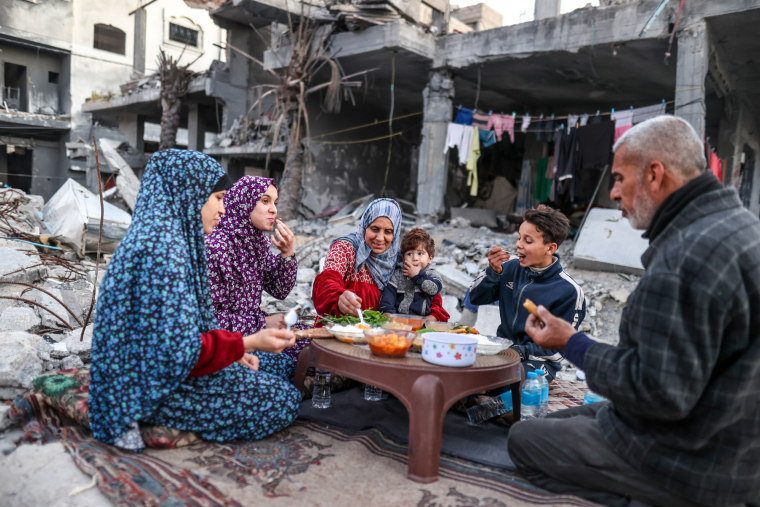On the eve of Ramadan, Hussein Owda and seven members of his family sat down for suhour — the meal Muslims eat before fasting from sunrise to sunset.
On the table in front of them were just 7 ounces of labneh, or yogurt cheese, and some bread.
“We didn’t finish it, because we are used to eating small amounts of food,” Owda, 37, told NBC News in a telephone interview.
The computer engineer, who was displaced to Rafah in southern Gaza, said he has lost about 65 pounds since the war between Israel and Hamas began on Oct. 7. Owda, like others NBC News spoke to, said he and his family had been forced to fast for about six months. Now that Ramadan has started, the only difference is that the fast is scheduled.
The ninth and most sacred month of the Islamic calendar, Ramadan is when Muslims believe the first verses of the Quran were revealed to the Prophet Muhammad. Around the world, millions who are able will fast during daylight hours to try to strengthen their connection to God and practice discipline and compassion for the less fortunate. Self-reflection, gratitude and celebration among community are at its core.
In Gaza, the usually joyous season marked by gatherings over traditional food and congregational prayers is unrecognizable. Homes once decorated with lights have been reduced to rubble, and tables once surrounded by families and laden with food are bare.
Amid a worsening humanitarian crisis in the enclave, where more than 31,000 people have been killed and over 25 have died of starvation, according to Gaza officials, many Muslims are seeking refuge in God and observing the fast as a testament to their unwavering faith during profound hardship.
Looming famine and broken traditions
On the first day of Ramadan, Salem Sbeta, 48, and his family traditionally eat chicken and molokhia, a stew made of jute leaves. Shopping and preparations for Ramadan would start a month earlier and include decorating the home and buying ingredients for traditional sweets, like qatayef — sweet stuffed pancakes — to eat after sunset.
“Normally we’d all be gathered, the whole family would be with me,” said Sbeta, who was displaced from Al Shuja’iyya, a neighborhood of Gaza City, to Rafah. “We’d be in the house, feeling safe. We had electricity, cold water, a fridge, juices. We made…
Click Here to Read the Full Original Article at NBC News World News…

